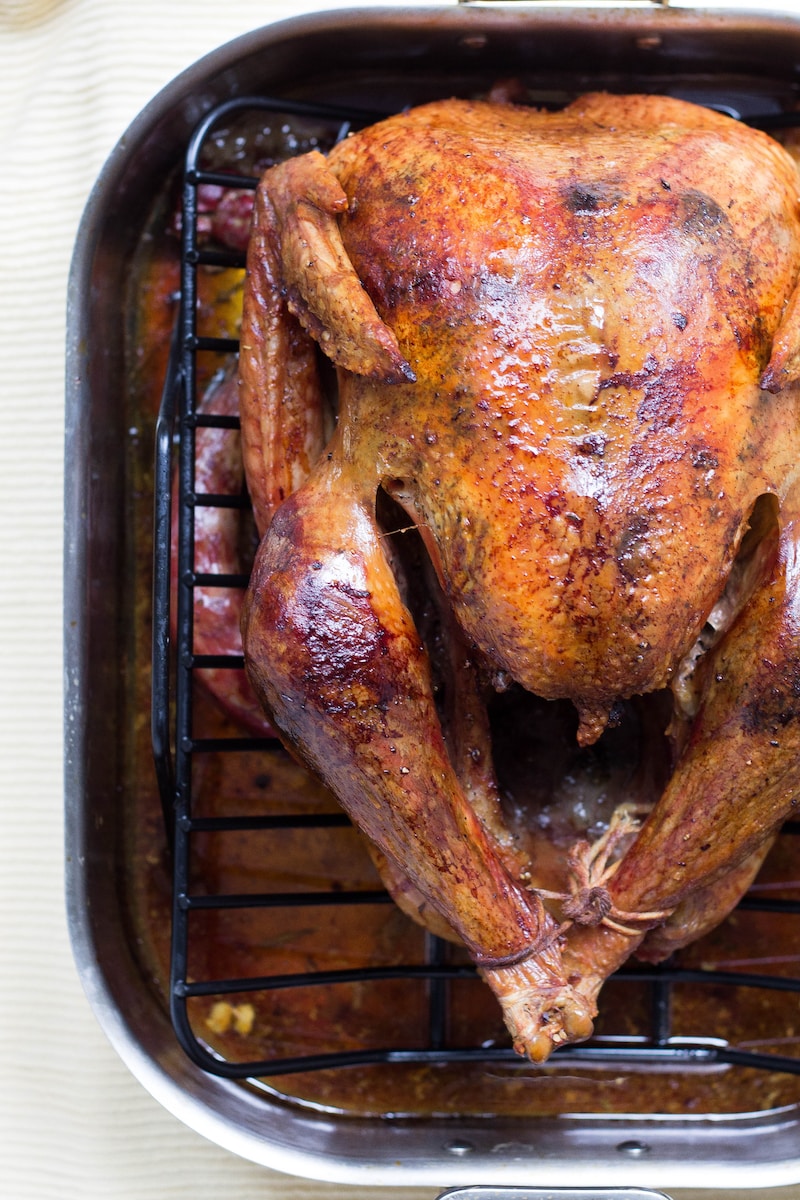Thanksgiving is just around the corner (or just passed for our Canadian friends), and with it comes the much-anticipated turkey feast. As you prepare for this grand culinary event, one crucial aspect that often gets overlooked is the proper thawing of your turkey.
Thawing is a vital step in ensuring that your bird cooks evenly and safely, avoiding any potential risks of foodborne illnesses. There is nothing worse than panicking about whether your turkey is ready to go. So, let’s delve into the importance of properly thawing a turkey and explore how long a thawed turkey can stay in the fridge.
The Importance of Properly Thawing a Turkey
Thawing a turkey may seem like an insignificant detail amidst all the other cooking preparations, but it can make or break your Thanksgiving meal. When a turkey is frozen, ice crystals form inside its tissues, which can compromise its texture and flavor if not thawed correctly.
Properly thawing allows for even distribution of heat during cooking and ensures that every succulent bite is as delightful as it should be. Moreover, improper thawing could leave parts of your turkey still icy when it hits the oven, resulting in uneven cooking.
This poses serious health risks as undercooked poultry harbors harmful bacteria such as salmonella or campylobacter. By taking the time to defrost your bird correctly, you mitigate these risks and ensure a safe dining experience for yourself and your loved ones.
How Long Can a Thawed Turkey Stay in the Fridge?
Now that we understand why proper thawing is essential let’s turn our attention to how long we can safely store our precious bird once it has been defrosted. The answer to this question depends on various factors such as temperature control, initial quality before thawing, and storage techniques employed. According to guidelines provided by the United States Department of Agriculture (USDA), a thawed whole turkey can be safely stored in the refrigerator for one to two days.
However, it’s important to note that shorter time frames are recommended for whole turkeys compared to individual parts. This is because whole turkeys tend to have a higher risk of bacterial growth due to their larger size and higher moisture content.
While the USDA guidelines offer a general recommendation, it’s crucial to understand that these timeframes can be influenced by factors such as the temperature of your fridge and the initial quality of your turkey before thawing. Additionally, there are alternative methods you can employ to extend the shelf life of your thawed turkey, which we will explore later in this article.
Factors Affecting Turkey’s Shelf Life in the Fridge
Temperature: Optimal Range for Refrigeration
When it comes to preserving the freshness and quality of your thawed turkey, temperature plays a crucial role. The optimal range for refrigeration is between 32°F (0°C) and 40°F (4°C). This cool environment slows down bacterial growth, keeping your turkey safe to consume for a longer period.
It’s important to note that the temperature inside your fridge may fluctuate, especially if it’s frequently opened or overcrowded. To ensure a stable temperature, use a refrigerator thermometer to monitor and adjust as needed.
Quality of the Turkey Before Thawing
The quality of the turkey before thawing can significantly impact its shelf life in the fridge. It’s essential to start with a fresh or properly frozen turkey from a trusted source.
Avoid purchasing turkeys with damaged packaging, tears, or signs of freezer burn as these factors can compromise its overall quality. Quality is crucial because any pre-existing contamination on the bird could multiply during thawing and affect its safety even within recommended time frames.
Proper Packaging and Storage Techniques
Proper packaging and storage techniques are vital to maintain the freshness of your thawed turkey in the fridge. After thoroughly defrosting the bird in its original wrapping, it’s advisable to transfer it into an airtight container or wrap tightly with heavy-duty aluminum foil or plastic wrap. This step prevents air exposure and reduces moisture loss, helping retain both flavor and juiciness.
Additionally, placing the turkey on a tray or plate can catch any potential juices that might drip during storage, preventing cross-contamination with other foods in your fridge. It’s worth mentioning that if you’re planning on storing leftover cooked turkey rather than a whole bird, proper portioning into airtight containers or zipper-lock bags is equally important.
This way, you can easily access and use smaller portions without exposing the entire batch to air or temperature fluctuations each time you open the fridge. Remember, taking these packaging and storage precautions will help maximize the shelf life of your thawed turkey and maintain its succulence for delectable enjoyment.
The Recommended Maximum Duration for Storing Thawed Turkey in the Fridge
When it comes to storing thawed turkey, it is crucial to adhere to recommended guidelines to ensure both the quality and safety of the meat. According to the United States Department of Agriculture (USDA), whole turkeys should be kept in the refrigerator for a maximum of 1-2 days after thawing. This timeframe allows for optimal freshness and minimizes the risk of bacterial growth that can cause foodborne illnesses.
Why Shorter Time Frames are Advised for Whole Turkeys
You might wonder why whole turkeys have a shorter recommended storage duration compared to turkey parts. The answer lies in their size and composition.
Whole turkeys, with their larger mass, take longer to thaw compared to individual parts. During this extended thawing period, bacteria have more time to multiply and potentially contaminate the meat.
Moreover, whole turkeys tend to have a higher moisture content and more surface area exposed during storage due to their shape. This combination increases the likelihood of bacterial growth and compromises food safety if stored for too long.
Tips To Ensure Safety Within Recommended Time Frame
To keep your thawed turkey safe during its recommended duration in the fridge, there are some essential precautions you should follow:
- Cold Storage: Ensure your fridge maintains a temperature below 40°F (4°C). A refrigerator thermometer can help you monitor this accurately.
- Airtight Packaging: Place your thawed turkey in an airtight container or wrap it tightly with plastic wrap or aluminum foil. This prevents cross-contamination with other foods while minimizing exposure to air that can accelerate spoilage.
- Proper Placement: store the thawed turkey on a lower shelf of the fridge to prevent any potential drips or leaks from contaminating other foods below.
- Frequent Checks: Regularly inspect your turkey for any signs of spoilage, such as off odors, slimy texture, or discoloration. If you notice any abnormalities, it is best to discard the meat immediately.
By following these recommendations and guidelines, you can guarantee that your thawed turkey remains safe and delicious for optimal enjoyment.
Extending Shelf Life through Alternative Methods
Creative Solutions for Leftover Thawed Turkey
When it comes to thawed turkey that you won’t be able to eat within the recommended timeframe, fret not! There’s a simple solution: freezing.
Freezing partially thawed turkey can help extend its shelf life and ensure that you don’t waste any of that delicious poultry goodness. By following a few easy steps, you can safely freeze your leftover turkey and use it at a later time.
Step-by-Step Guide on How to Safely Freeze Partially Thawed Turkey
To begin the process of freezing your partially thawed turkey, make sure it is still cold but not completely defrosted. Ideally, it should still have some ice crystals present as this helps to retain moisture during the freezing process.
Start by removing any giblets or stuffing from the cavity of the bird before proceeding. Next, you’ll want to wrap the turkey securely in heavy-duty aluminum foil or freezer paper.
This will help prevent freezer burn and keep your turkey tasting fresh when you’re ready to use it later on. Once tightly wrapped, place the wrapped turkey into a resealable plastic bag or an airtight container suitable for freezing.
Storage Duration and Precautions When Using This Method
When properly frozen and stored, your partially thawed turkey can remain safe for consumption for up to four months in the freezer. It’s crucial to label your package with the date of freezing so that you can keep track of its storage duration.
Remember always to practice good food safety habits when handling frozen food items. Ensure that your freezer maintains a consistent temperature below 0°F (-18°C) throughout storage.
If there are any signs of freezer burn or an off smell upon thawing, it’s best not to consume it. Trust your instincts and prioritize your health and safety when deciding whether to use frozen turkey beyond the recommended storage duration.
Freezing partially thawed turkey is a smart way to make the most out of your leftovers while ensuring they remain safe to eat. So, don’t let any precious poultry go to waste – embrace the power of freezing and enjoy delicious turkey dishes year-round!
Signs of Spoilage and Safety Precautions
Visual Indicators: Changes in Color, Texture, and Odor
When it comes to determining whether your thawed turkey has gone bad, your senses are your best allies. Keep a keen eye out for any changes in the color of the meat.
Fresh turkey should have a rosy pink hue, but if you notice any greenish or grayish tinges, it’s a clear sign that things have taken a turn for the worse. Additionally, pay attention to the texture of the meat.
If it feels slimy or sticky to the touch, it’s an indication that spoilage has occurred. One of the most reliable indicators of spoilage is the odor emanating from your thawed turkey.
Ideally, fresh turkey should have a mild, slightly sweet smell. However, if you detect an offensive or foul odor resembling ammonia or sulfur, it’s time to bid adieu to that bird and steer clear of consuming it.
Potential Health Risks Associated with Consuming Spoiled Turkey
Consuming spoiled turkey can lead to unpleasant consequences for your health. Bacteria such as Salmonella and Campylobacter are common culprits found in spoiled poultry products and can cause food poisoning symptoms like nausea, vomiting, abdominal cramps, and diarrhea.
These bacteria thrive in warm environments and multiply rapidly on improperly stored or expired meats. Furthermore, spoiled turkey may contain toxins produced by certain bacteria such as Clostridium perfringens or Staphylococcus aureus.
These toxins are heat-resistant and cannot be destroyed by cooking alone. Ingesting these toxins can result in severe food poisoning symptoms within just a few hours after consumption.
To ensure your safety and wellbeing when handling thawed turkey leftovers from the fridge, always trust your senses when assessing its quality. Remember, it’s better to be safe than sorry when it comes to your health and enjoyment of delicious meals.
Alternative uses for leftover thawed turkey
Creative recipes
When it comes to utilizing leftover thawed turkey, the options are truly limitless. Instead of settling for plain old turkey sandwiches (though those can be delicious too!), consider incorporating your leftover bird into some creative and mouthwatering recipes.
One scrumptious idea is to make a hearty turkey pot pie. Simply combine diced turkey with vegetables like carrots, peas, and potatoes in a creamy sauce, then cover it all with a flaky pastry crust and bake until golden brown.
The result? A comforting and satisfying dish that will have your taste buds singing songs of joy.
If you’re in the mood for something with an exotic twist, why not try making a tangy Thai-inspired turkey salad? Toss together shredded turkey with crunchy vegetables like bell peppers, cucumbers, and bean sprouts.
Then whip up a zesty dressing using ingredients like lime juice, fish sauce, chili paste, and fresh herbs such as cilantro or mint. This refreshing salad is bursting with flavors that will transport you straight to the bustling streets of Bangkok.
Conclusion
While it’s important to know how long a thawed turkey can stay in the fridge to ensure food safety, it’s equally crucial to explore the enticing possibilities that arise from leftovers. By getting creative in the kitchen and trying out different recipes using your excess turkey meat, you can transform what might have been mundane meals into incredible culinary experiences. So don’t let those leftovers go to waste!
Embrace their potential and embark on a journey of gastronomic delight. Remember: cooking is an art form that allows us to express ourselves and bring joy to others through food.
So whether you’re concocting an amazing pot pie or crafting an exotic salad bursting with vibrant flavors, savor every moment of the process and relish the satisfaction of turning humble leftovers into something extraordinary. Happy cooking, and bon appétit!


